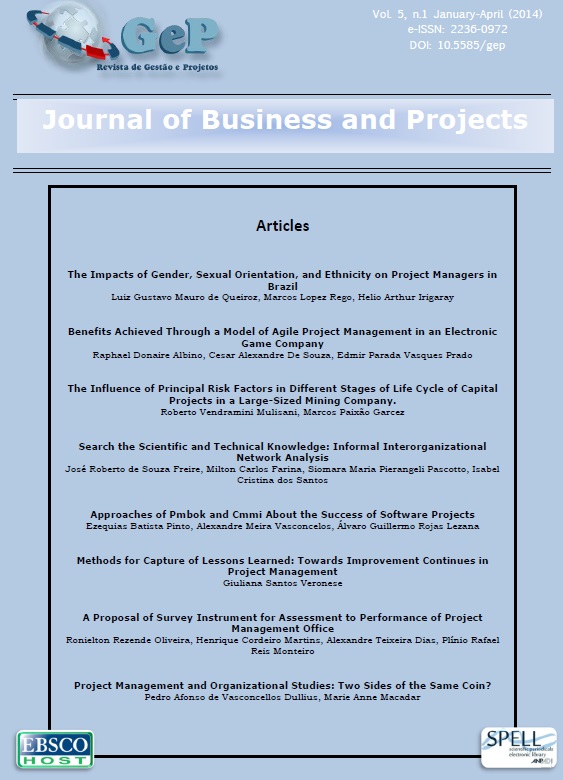Project Management and Organizational Studies: Two Sides of the Same Coin?
DOI:
https://doi.org/10.5585/gep.v5i1.249Keywords:
Gestão de Projetos, Organizações Temporárias, Escritórios de Gerenciamento de ProjetosAbstract
This theoretical essay aims to discuss the differences and similarities between traditional and temporary organizations, which are regarded as "projects" here. We question the viability of treating them under the same organizational approach, since they differ in nature. We assume, as a principle, that social organizations are multifaceted phenomena and can, therefore, be analyzed from various perspectives. Thus, based on our expertise in Project Management, in particular in Project Management Offices, we address the differences and similarities between traditional and temporary organizations.
References
Bernstein, S. (2000). Project Offices in Practice. Project Management Journal, 31(4), p.4-6.
Block, T.R. & Trame, J. D. (1998). The Project Office: A Key to Managing Projects Effectively. Crisp Publications.
Bradley, J. W. (1998). Year 2000 Project Management Office (PMOs). Proceedings of the 29th Annual Project Management Institute. Long Beach, Califórnia, USA: 9-15.
Bridges, D.N. & Crawford J. K. (2000). How to Startup and Rollout a Project Office. Houston, Texas, PMI Symposium.
Casey, W. & Peck, W. (2001). Choosing the Right PMO Setup. PM Network.
Drucker, P. (1981). Prática da administração de empresas. São Paulo: Cengage Learning
Englund, R. L. & Graham, R.J. (2001). Implementing a Project Office for Organizational Change, PM Network.
Fayol, H. (1965). General and Industrial Management. London: Pitman.
Fleming, Q. W. & koppelmn, J.M. (1998). Project teams: The role of the Project Office, Cost Engineering; Morgantown.
Freeman, R. E. (2013). Strategic Management: A Stakeholder Approach [Kindle Edition]. Cambridge: Cambridge University Press.
Gaddis, P. O. (1959). The Project Manager. Harvard Business Review, 37(3), p. 89–97.
Levine, H. (1997). The Project Office Revisited. PM Network.
Lundin, R. A., & Söderholm, A. (1995) A theory of the temporary organization. Scandinavian Journal of Management, 11(4), p. 437–455.
Melymuka, K. (1999). Project Office: A Route to Better Performance. Framingham, Computerworld.
Miller, J. (1998). Project Office – One of the Fastest Growing Segments in Information Systems. Proceedings of the 29 th Annual Project Management Institute. Long Beach, Califórnia, USA: 9-15.
Morgan, G. (2006). Images of Organization. Updated ed. Thousand Oaks: SAGE Publications, Inc; Updated edition.
Murphy, R.E. (1997). The Role of the Project Support Office. PM Network.
Patanakul, P., & Shenhar, A. J. (2012). What project strategy really is: The fundamental building block in strategic project management. Project Management Journal, 43(1), p. 4–20.
Pinto, J.K. (2002). Project Management 2002. Research Technology Management: Washington.
Project Management Institute - PMI. (2013). A Guide to the Project Management Body of Knowledge. 5th. ed. Newton Square.
Prado, D. (2000). O Escritório de Projetos. In: Prado, D. (org.). Gerenciamento de Projetos nas Organizações, Belo Horizonte, EDG.
Schmidt, T. (2009). Strategic Project Management Made Simple: Practical Tools for Leaders and Teams [Kindle Edition]. 1. ed. Hoboken: Wiley.
Turner, J. R., & Müller, R. (2003). On the nature of the project as a temporary organization. International Journal of Project Management, 21(1), p. 1–8.
Weber, M. (1978). Economy and Society: An Outline of Interpretive Sociology. [s.l.] University of California Press.
Wernerfelt, B. (1984). A resource-based view of the firm. Strategic Management Journal, 5(2), p. 171–180.
Downloads
Published
How to Cite
Issue
Section
- Abstract 295
- PDF (Português (Brasil)) 198







